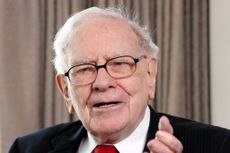Vanguard Index Funds’ Fees Are Going Even Lower
Owners of Vanguard index funds’ Investor class shares to be moved into Admiral class

Like the Hundred Years’ War between England and France some six centuries ago, the fee war between fund firm giants Fidelity and Vanguard is more about ongoing skirmishes than a single, conclusive battle. The latest salvo comes from Vanguard.
Changes announced today by the Malvern, Pennsylvania-based fund behemoth will save money for investors via two steps. First, Vanguard lowered the investment minimum for its Admiral share class index mutual funds – about 38 portfolios – from $10,000 to $3,000. As part of the move, investors holding the Investor share class, which required a $3,000 minimum to buy shares for the first time, will be moved into the Admiral share class. New buyers are being directed away from Investor class shares and toward Admiral class shares.
That’s where the savings come in: Admiral share classes cost 15% to 71% less than their Investor class counterparts. Vanguard estimates existing shareholders of its Investor share class index funds – some 1.5 million investors – stand to save about $71 million in annual fees, based on current assets. “Our unique, client-owned structure enables us to consistently pass along economies of scale and lower the cost of investing for our clients,” Vanguard CEO Tim Buckley says.

Sign up for Kiplinger’s Free E-Newsletters
Profit and prosper with the best of expert advice on investing, taxes, retirement, personal finance and more - straight to your e-mail.
Profit and prosper with the best of expert advice - straight to your e-mail.
The shift includes three of the biggest index funds in the country, measured by assets: Vanguard Total Stock Market Index Fund (VTSAX), Vanguard 500 Index Fund (VFIAX) and Vanguard Total Bond Market Index Fund (VBTLX), which together have some $1.3 trillion combined in total fund assets.
Vanguard also has filed with the SEC to launch Admiral share versions of five other index funds. Vanguard expects those shares to be available in the first quarter of 2019.
Vanguard’s cost cutting comes after what looked like a “game over” move from Fidelity. In an industry first, the Boston-based firm in August 2018 launched two index mutual funds that charge no fee at all. One of them, Fidelity ZERO Total Market Index Fund (FZROX), amassed $1.3 billion in assets in the first three months since it opened. Fidelity launched another two portfolios in September 2018: an index fund for small and mid-size U.S. firms, and a foreign-stock index fund.
Fund firms will no doubt continue to battle it out, but it’s clear who the ultimate winner is in these fee wars – investors.

To continue reading this article
please register for free
This is different from signing in to your print subscription
Why am I seeing this? Find out more here
Get Kiplinger Today newsletter — free
Profit and prosper with the best of Kiplinger's advice on investing, taxes, retirement, personal finance and much more. Delivered daily. Enter your email in the box and click Sign Me Up.

Nellie joined Kiplinger in August 2011 after a seven-year stint in Hong Kong. There, she worked for the Wall Street Journal Asia, where as lifestyle editor, she launched and edited Scene Asia, an online guide to food, wine, entertainment and the arts in Asia. Prior to that, she was an editor at Weekend Journal, the Friday lifestyle section of the Wall Street Journal Asia. Kiplinger isn't Nellie's first foray into personal finance: She has also worked at SmartMoney (rising from fact-checker to senior writer), and she was a senior editor at Money.
-
 5 Stocks With Solid Growth History and a Promising Outlook
5 Stocks With Solid Growth History and a Promising OutlookFive reasonably priced stocks with solid growth history and a good chance of delivering earnings even if the economy softens.
By Kim Clark Published
-
 Amazon Prime Day vs Walmart Deal Days: Which Is Better?
Amazon Prime Day vs Walmart Deal Days: Which Is Better?From household goods and clothing to electronics and toys, which retail giant is the clear winner? The answer may be both.
By Kathryn Pomroy Published
-
Warren Buffett Adores Apple as Much as Ever
Berkshire Hathaway trimmed its Apple stake because taxes are "likely" to go up "later."
By Dan Burrows Published
-
Warren Buffett Stocks: Analyzing The Berkshire Hathaway Portfolio
The Berkshire Hathaway portfolio is a diverse set of blue chips and some lesser-known growth bets. Here, we look at all stocks picked by Buffett and his lieutenants.
By Dan Burrows Last updated
-
Smart Ways to Invest Your Money This Year
Following a red-hot run for the equities market, folks are looking for smart ways to invest this year. Stocks, bonds and CDs all have something to offer in 2024.
By Jeff Reeves Published
-
Vanguard's New International Fund Targets Dividend Growth
Investors may be skittish about buying international stocks, but this new Vanguard fund that targets stable dividend growers could ease their minds.
By Nellie S. Huang Published
-
Where To Invest Your 401(K)
Knowing where to invest your 401(k) money can be difficult. Here, we rank 10 of the largest retirement funds.
By Nellie S. Huang Published
-
Fidelity Strategic Income Fund Excels In Hard Year for Bonds
The fixed-income market was volatile in 2023, but this Fidelity bond fund outperformed its peers thanks to strategic moves by management.
By Nellie S. Huang Published
-
6 Best Books on Investing
investing These six books will help you be a better investor.
By Coryanne Hicks Last updated
-
What Is Margin Trading?
Margin trading involves investing with borrowed money. The practice is high risk, but it can also have big rewards.
By Jeff Reeves Published







